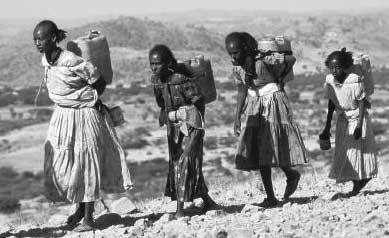A History Worth Celebrating
There can be little doubt that International Women’s Day is a time of appreciative reflection for Eritreans around the world. Women played an important role in the struggle for independence, both on the frontline, and within the non-military departments and mass organizations of the two major liberation fronts. Some estimate that nearly 30 percent of the EPLF’s membership was comprised of women, many of who joined the movement as early as the 1970s. Equally important was the moral and material support that thousands of women civilians, in Eritrea’s villages, towns, and diaspora, provided to the cause of self-determination. It is no exaggeration to say that the Eritrean independence struggle was shouldered on the backs of an entire generation of Eritrean women.
The prominence of women within the national struggle was not simply a matter of necessity. No doubt, the recruitment of women filled critical human resource needs for the fledgling independence struggle. But it also reflected the Eritrean revolution’s deep commitment to progressive social values and social change. Seen from this view, the Eritrean struggle was not simply about liberating the land from an occupying force, but transforming society from top to bottom. This meant discarding old hierarchies and gendered norms about a women’s proper “place “ in the world, and replacing them with an ethos of equality that stressed women’s empowerment through education and economic rights.
After independence, women have continued to play an important role in the fate of our nation. Through their participation in the national service program they have contributed to national defense and national projects in the sectors of education, health, transportation, etc. They have also played vital roles in holding together Eritrean families in what have been trying times. We all owe our mothers, grandmothers, sisters, and daughters, significant gratitude.
An Honest Conversation About Gender
Yet International Women’s Day should serve as more than a moment to recognize the contributions of successive generations of Eritrean women. Nor should this be a day primarily reserved for self-congratulation, although as a society we have made significant strides. Such behavior is a recipe for inertia not progress. Rather than celebrating where we have been and how far we have come, International Women’s Day should be an opportunity to properly index the serious challenges we must overcome.
There are two major issues of concern to us. First, are the significant inequalities that persist in a diverse range of economic and social sectors. Access to education is a particular area of concern. But this is no surprise for a developing African country still steeped in traditional modes of social practice and thinking. We must redouble our efforts in this regard. There is no doubt the Eritrean diaspora has a special role to play given some of its success in breaking down (at least to some degree) gender inequities.
The other issues is perhaps more intractable, and gets to the fundamental question of political power. The harsh reality is that women are often employed as “props” in our communities, used to signal the progressive credentials of male dominated processes and institutions. This means women are often “granted” descriptive representation in decision-making structures, but little substantive voice. Even if Eritrean women are sitting at the table, we need to ensure that they shape the agenda and determine outcomes.
Thus, within our own diaspora communities, and at all levels of our society, we must strive to address the core issue of how gender inequality affects political power: this of central importance to how our interests are defined, and how we make decisions about those interests. The solution, of course, starts with leadership. Until women sit at the forefront at of initiatives and institutions within communities across the diaspora and at home, discussions of gender equality will fall short. True equality requires empowering women politically.


Great piece! I wholeheartedly agree w/ the authors thoughts re inertia vs progress, “… International Women’s Day should be an opportunity to properly index the serious challenges we must overcome.”
Good news is we have a deep “army” of women to tackle our challenges. My generation of immigrant women, high minded millennials & our little but fierce young daughters/girls.
My hope lays with our youngest change makers. I have two daughters 2 yr & 5 yr old. They have black girl magic in spades. Put them in a group of 5 other people and they will make their voice heard. They don’t allow others to blanketly dictate they’re playing tag instead of jumping in puddles. If they’re in a leadership position on a play date; they listen, take input from others & don’t leave a friend behind. That’s my ethos “bring everyone along” so all our Eritrean children have acess to good(!) education. Teach our girls to respect their bodies & demand the same of others. Teach them traditional roles/norms are boring & of another era.
I wish all our Eritrean women, young & not-so-young a happy Women’s Day. It’s an amazing time to be us!